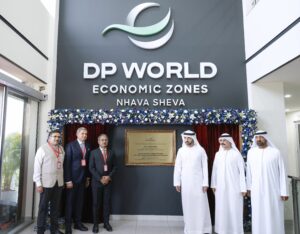Ericsson has joined The Pathways Coalition, a group of innovative companies representing the infrastructure, utilities, transportation and retail sectors, with the ambition to accelerate decarbonisation of heavy transport and reach the objective of zero CO2 emissions latest by year 2050 or earlier, in line with The Paris Agreement. Find out how Ericsson will support the coalition with its unique expertise here.
Today, transport is the second largest source of global CO2 emissions and currently contributes nearly a quarter of all global emissions. Within this, commercial heavy transport represents a significant share of the pie, and in order to reach the climate target set in The Paris Agreement, it is essential to fully decarbonize commercial heavy transport by the year 2050 or earlier.
Produced and published by The Pathways Coalition, The Pathways Study concludes that a transition to decarbonized heavy transport is not only possible, but also financially attractive from a societal perspective. However, to tackle the challenge and speed up the pace of change, cooperation across sectors is necessary. The four companies that have formed The Pathways Coalition – E.ON, H&M Group, Scania and Siemens – represent different parts of the value chain for electrified transport: energy infrastructure provision, energy solutions and supply, vehicle manufacturing, as well as retail with the transport buyer perspective.
A successful de-carbonization of heavy transport will depend on how well the transport, energy and digital sectors can realize the required integration of infrastructures and services from a planning and operational perspective as well as from a business model and regulatory perspective.
With Ericsson from the digital sector now joining the coalition to share its expertise within digitalization and advanced connectivity, it will add a missing piece to advance the pace of change necessary across this crucial sector. Ericsson will also bring its experiences as a major buyer of transport services for the global distribution of its mobile network equipment and the successful work to reduce CO2 emissions in its own supply chain.
Mats Pellbäck Scharp, Head of Sustainability at Ericsson and responsible for the organization’s cooperation with the coalition, says its unique cross-sector setup is the key to success.
“The coalition is unique from the perspective that we have a cross-value chain approach instead of a within-industry approach – most industry associations like this are comprised of members all from the same industry and are focused on working with your peers in the same industry more or less,” Pellbäck Scharp says.
“We understood that the coalition was seeking a digitalization partner and our involvement felt very natural from both a sustainability and technology perspective, as well as what we thought we could bring to the table to help this coalition reach its objectives.”
Ericsson aims to support the coalition with its unique insights into how digitalization and especially 5G will open up new opportunities for all industry sectors, and more specifically, for making fossil-free road transport a reality.
Managing big data, connected vehicles and infrastructure, as well as more sophisticated digital tools is crucial to reduce emissions faster and generate the efficiencies needed for success. Ericsson will provide important contributions to realize these goals through its competence and experience in the Internet of Things (IoT) and the high-speed and low latency connectivity provided by 5G.
The company’s expertise in these areas will be used to envision and showcase how intelligent planning of transport systems and increased efficiency in the management of e-commerce can reduce the amount of transports needed. Faster and more secure connectivity of vehicles can also enable more refined policy instruments to increase the speed of transition to alternative fuels and solutions for commercial heavy transportation.
Olle Isaksson, Director Global Partnering Industry Verticals at Ericsson says: “The services and infrastructures of transport, energy and digital will have to get much more integrated from a planning and operational perspective as well as from a business model and regulatory perspective. We firmly believe in the strength of cross-sector partnering and ecosystems to realize this integration and we are convinced that 5G and easy-to-use global connectivity have the capacities to enable a smarter, more efficient and sustainable transport system. The Pathways Coalition will be an important accelerator for this, and we are very happy and motivated to contribute as a new member.”
An immediate priority of The Pathways Coalition is to prototype and demonstrate new potential solutions for possible adoption in the transport industry that will accelerate and contribute to reaching its goals.
“There are already discussions with members of the coalition on how we can really take the next step and demonstrate our thoughts and ideas on how we can use digitalization, electrification and other fossil-free alternative energy sources to replace traditional fuels and progress this industry toward a fossil-free future,” Pellbäck Scharp says.












